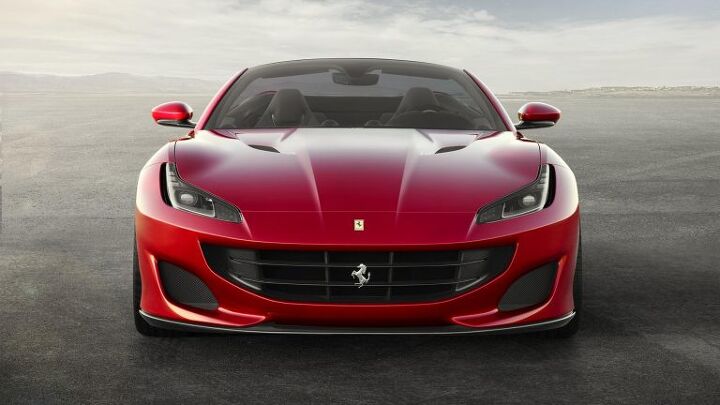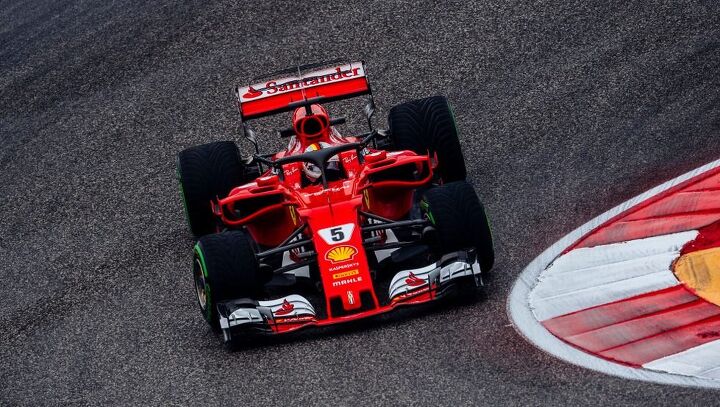#FerrariNV
Ferrari Says Majority of Sales Will Be EVs, Hybrids by 2030
Last week, news broke that Ferrari was plotting a third assembly line in Maranello dedicated entirely to EV production. But this turned out to be little more than a preamble for the obligatory announcement that the company would eventually transition toward building electric vehicles.
On Thursday, the Italian automaker told investors that all-electric and hybrid models will make up 80 percent of its global sales volume by 2030. This is to be done via a slew of new products it hopes to launch between now and 2026. Though the first Ferrari to run exclusively on battery power isn’t scheduled to arrive until 2025. According to the manufacturer, it’s plotting to launch 15 new vehicles as part of the overarching strategy. While some of those will undoubtedly be duplicates boasting open-air cockpits and slightly different powertrains, it has still got to be some kind of record for the brand.
Report: Ferrari Plotting Italian EV Assembly Line
Ferrari is rumored to be preparing a third assembly line in Maranello, Italy, dedicated for electric vehicles. The automaker has already purchased land near the facility and is presumed to make an official announcement on June 16th when it’s scheduled to present its four-year business plan.
As usual, this comes from a major media outlet that cited unnamed sources from within the industry. Though, considering the luxury sports car manufacturer’s confirmation that it would begin producing hybrid and all-electric automobiles, it’s more than plausible. Ferrari’s first battery electric vehicles are scheduled to arrive in 2025 and it still needs somewhere to build them.
Following the Trend: Ferrari Developing Electric Supercar to Compliment Its SUV
Despite referring to the mere notion of an electric Ferrari as “obscene” in 2016, chief executive officer Sergio Marchionne is now saying the brand is obligated to build one. The situation is familiar to what happened with the brand’s upcoming sport utility vehicle — Sergio claimed it would never happen and, roughly a year later, flipped the script.
The SUV is supposed to reach the public by late 2019 or early 2020. However the battery-electric Ferrari won’t come until the brand has established a few hybridized powertrains first. Marchionne claimed that “going from there to an electric is easy,” prefacing the plan with “We do it because we have to do it.”
Formula One Responds to Ferrari's Unenthusiastic Reaction to New Rules
Last week, Ferrari CEO Sergio Marchionne expressed his distaste for what he perceived as a less-than-desirable update to Formula One’s engine rules. He even suggested the brand might remove itself from the sport if Liberty Media doesn’t reconsider some of its proposals for 2021.
“I understand that Liberty may have taken these into account in coming up with their views,” Marchionne said. “But I think it needs to be absolutely clear that unless we find a set of circumstances, the results of which are beneficial to the maintenance of the brand, and the marketplace, and to the strengthening of the unique position for Ferrari, Ferrari will not play.”
Still in the midst of discussions, Formula One took time to defend itself against Ferrari’s claim that the new rules would make it the global equivalent of NASCAR.
Ferrari Thinks F1 Can Shove Those New Engines, Threatens to Quit
Ferrari, the company that has participated in every single Formula One championship since its inaugural season in 1950, is threatening to give up the sport if U.S.-based Liberty Media follows through with its new engine rules. Depending on how you like your motorsport, Ferrari is either completely vindicated in its criticisms or overacting like a spoiled child.
Evolving rules are nothing new in Formula One. Changes are often made between seasons to bolster safety or improve competitiveness. But Ferrari NV isn’t interested in what’s to come after F1’s concorde agreement ends in 2020. Liberty Media has been pushing for engine rules that would make powerplants noisier and higher revving but also more uniform between teams. With a focus on a cheaper and simpler engine, F1’s new owner is also expected to suggest revenue caps on teams next week. The end result should be closer races. But that places it at odds with the Italian manufacturer’s goals of winning all the time.
Ferrari Makes No Bones About Its 'Utility Vehicle' Being About Anything Other Than Money
Ferrari will likely add a comparatively spacious four-seat “utility vehicle” to its lineup in the hopes of bolstering volume and doubling its profits by 2022. The strategy certainly has worked for Porsche. So well, in fact, that Lamborghini has made plans to introduce the Urus SUV for 2019 — using Volkswagen Group’s MLB platform. The spiritual successor to the wild LM002 is expected to outperform Bentley’s ludicrous Bentayga and would likely be Ferrari’s chief rival in the super sport utility segment.
The concept of a Ferrari-built SUV has drifted around the automaker’s Maranello and Amsterdam offices for a few years, but now inside sources claim a comprehensive strategy for the vehicle should be unveiled by 2018. However, enacting it would fundamentally change the brand.
As a low-volume automaker, Ferrari is not subject to the same rigid emissions regulations imposed on other car companies. But CEO and sweater aficionado Sergio Marchionne has been pressing the company to increase volume ever since taking the company’s helm in 2014, consequences be damned.





















Recent Comments